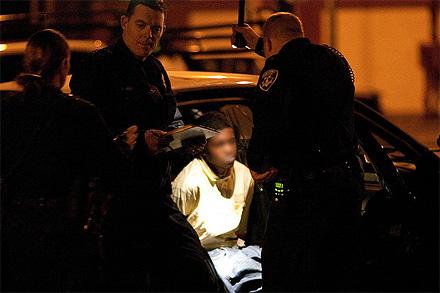http://t.co/xU5jMqL
It’s late Saturday night and you get a phone call. Your teenage son has been arrested. You show up for court on Monday morning unsure what to do or say. Now there’s help for parents in this predicament. It's called Juvenile Justice 101.
Learning quicklyThe class, really just a 15 minute orientation, is held in the middle of the very busy lobby of King County's Juvenile Court. Teenagers charged with everything from shoplifting to robbery to illegal gun possession appear in the courtrooms here.
It's by design that Juvenile Justice 101 is held in the midst of prosecutors and defense attorneys coming and going, a beeping metal detector and constant loudspeaker noise.
Organizers say it's by design that parents and guardians will literally bump into the class. Sarah Walker, University of Washington researcher, says the original idea was to try and take parents to a quiet room.
"But it was decided that we should stay in the lobby area because we had the opportunity to catch people who may not volunteer to go sit through an orientation but can benefit from it and might pick up stuff just because we're speaking loudly in the waiting room," said Walker.The presentation for parents includes a video about how the court system works and testimonials from other parents who've been through the ordeal of having a child in the juvenile justice system. Practical advice is handed out as well. Parents are told to bring a book to help pass the time spent waiting.
The Juvenile Justice 101 project focuses on parents because there’s a general sense they are the forgotten parties in the juvenile justice system. It’s the reason the MacArthur Foundation has pumped money into the project through Washington's Models for Change Program.
Parents out of the loop
Juvenile court, as the name implies, was set up for juveniles. Although their children are represented by counsel, parents have no legal rights within the court system. It’s not that the court is deliberately anti-parent. It’s just that it isn’t anybody’s job to advocate for them.
And it's easy for parents to feel shut out.
On the day I visit, a couple from Bellevue sits outside a small conference room. Their 16 year old son is inside the room talking with his attorney. The parents aren't privy to the discussion because of the child's right to confidentiality. It's hard, the mother tells me.
“We’re not allowed to be involved in the planning that goes on when we go to court or anything. We feel like we don’t always know what’s going to be happening. That's been a very unusual experience for us," she said.Karen Traylor, director of the Juvenile Justice 101 project, knows what families are going through. Her foster daughter once ended up in juvenile court. Now she reaches out to others.
“You see families that come in and you can see it on their faces. They're lost. They're afraid. They're broken hearted. I've seen families com in and just weep all the way through the presentation,” Traylor said.
Getting through it
Malitha Williams, who now works as a Juvenile Justice 101 presenter, still remembers the terror she felt several decades ago when her teenage son was arrested.
"I got a call out of the blue. I panicked, because I was so freaked out. I was just overwhelmed,” Williams said.Now she counsels parents who find themselves in similar situations to "get past themselves."
"They need to get beyond the thoughts of what they did or didn't do or what they could have done differently," she said.And Williams says for parents who are overwhelmed having someone give them even very basic information, which Juvenile Justice 101 does, can be incredibly useful.
A tissue and a hug
As the short Juvenile Justice 101 presentation concludes, I ask a woman who looks as if she's been up all night crying if she found the orientation useful. "Yes, a little bit," she says. She tells me she's there because her teenage daughter was arrested, she doesn't want to say why. She won't see her daughter until she's brought into court for a hearing.
As she sniffles, Karen Traylor comes up and gives her a tissue. She comforts her and tells her everything is going to be alright.
Parent advocates say it's moments like this, the one on one and parent to parent support that is the real power of a project like Juvenile Justice 1010.

No comments:
Post a Comment